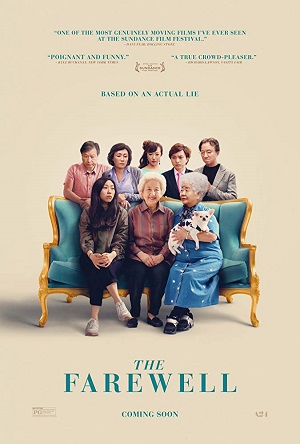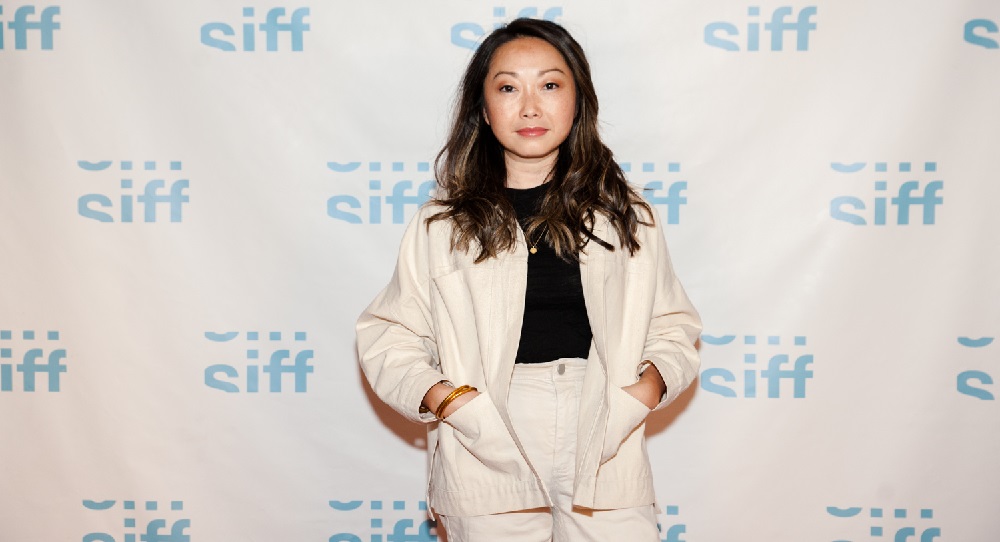
“The Farewell” – Interview with Lulu Wang
by Sara Michelle Fetters - July 20th, 2019 - Film Festivals Interviews
a SIFF 2019 interview
No Right Answers
Filmmaker Lulu Wang on finding universal truth inside a family’s lie with The Farewell
Since debuting her film at Sundance earlier this year, The Farewell writer/director Lulu Wang has been on something of an adrenaline-fueled whirlwind rollercoaster ride. An obvious labor of love, the filmmaker based the story for her sophomore feature-length effort on an event from her own life. That it has struck such a positive chord, that the motion picture has generated an outpouring of affection from critics and audiences alike, all of that has meant something distinctly personal to Wang, and she doesn’t take a single one of these responses for granted.
“Before we premiered at Sundance, I thought, well, people can’t hate it, right?” asks the director with a self-effacing chuckle. “I mean, what kind of terrible person would hate this movie that I made as a tribute to my grandmother? I really felt like I put my heart into it. But I [did] brace myself because you never know in this industry. I was like, whatever people say, I’m going to be okay with it. But, yeah, I definitely didn’t expect this kind of a reaction.”
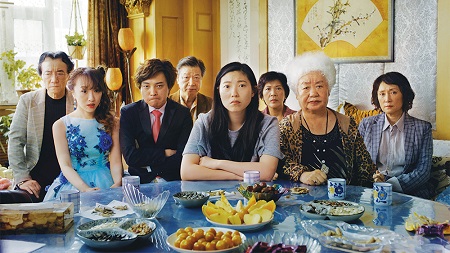
The Farewell is the story of Chinese-American Billi (Awkwafina). An unemployed writer living in New York City, she is suddenly left shell-shocked when her parents Haiyan (Tzi Ma) and Jian (Diana Lin) call to inform her that her beloved grandmother Nai Nai (Zhao Shuzhen) likely only has a few more weeks to live. Additionally, per Chinese tradition they’re not revealing the diagnosis to the old woman. Instead, they’ve plotted a fake wedding involving one of Billi’s cousins so the entire family can get together for a reunion, and they’re not entirely sure they want their daughter to attend as they fear her American distaste for their plan will lead her to reveal their ruse to Nai Nai.
Along with Silver Screen Riot editor Matt Oakes, I had the distinct pleasure to sit down with Wang a few short hours before The Farewell would screen as the closing night attraction at the Seattle International Film Festival. It was a friendly conversation, one that involved several important plot points that could be construed as spoilers, most of which I’m going to try to keep from revealing here. In the end, the three of us primarily focused on the various themes that make up the story the director is telling and how she was able to make them so culturally-specific and yet so universally accessible at the exact same time. Here are some of the edited excerpts from our much, much too short round table conversation:
Question: I was curious. When you do write something so personal, how do you balance telling an accurate and truthful story with also making sure that the fictionalized elements are still authentic to you, your family and your story?
Lulu Wang: I think that I just asked myself what is the film about. It’s about how different members of a family grieve and their relationships to [this] impending death. But it is also this lie. I just try to keep those relationships, like the relationship to grandma and their relationship to death and her impending death, authentic. What do we need to know about these characters to understand why they feel the way they do?
For example, with dad and uncle, their guilt. Part of losing [Nai Nai] is also to grapple with the guilt that they haven’t been around. That they left. I really tried to stay true [to our family’s story]. Whereas certain facts, like when they go to the hospital or the chronological sequence of events, none of that is as important. The truth of our family’s story and how we each dealt with this situation was.
Question: Is it okay to lie for the greater good?
Lulu Wang: I don’t have an answer to that. I don’t think the movie does, either. I didn’t make the movie to necessarily answer that question. I made the movie to explore the different sides of the situation, to show that there are different perspectives and it isn’t about having one answer.
Question: You took the words right out of my mouth. There is no clear-cut answer. But I am curious, how do you stand on this family secret now?
Lulu Wang: I think that I stand where I kind of always have. I don’t know what’s right and what’s wrong. I think that every situation is different. Every family is different. I don’t think that I have a clearer answer now than I did back then. If I was the one making those choices [to lie]? I don’t think that the movie is about that. I think so much of life is about the gray zone and trying to grapple with it, trying to let go of our need for answers. I don’t know if lying for the greater good is right. I don’t know if this lie was right. I do know that I thought that it was wrong [at the time].
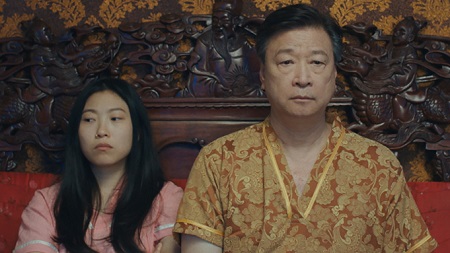
But this lie has enabled me to make this movie. Not only that, but the lie has enabled me to go back to China and spend three months [in my grandmother’s] hometown. I mean, never in my life did I ever think that [my family] would actually be able to be on my movie set and watch me do what I do. I didn’t even know if I would ever make movies, much less have my [family] there to witness it.
So, I don’t think that when I was back in 2013 trying to stop the lie from happening I could’ve imagined what it would lead to. I think that says so much about how life works. We try to control things. Sometimes the universe has other plans.
Question: How do you distill decades of family history down to fit it all into a feature-length running time?
Lulu Wang: It was challenging because there’s a lot about my family that I would have loved to include. There are so many different sides. Like my father is a diplomat and he lived in the Soviet Union for many, many years before he met my mother. He was once entrapped by the KGB. None of that is in this movie.
I was like, should it be? But it just didn’t belong. Instead, in this movie he’s in his underwear and he’s drunk and he’s being rolled around on the bed. How do I explain that to my father? How do I tell him we’re not going to show these amazing life accomplishments, but instead we’re going to show that [he gets] drunk and wears red underwear? [laughs]
I had to separate [the script] from my family. These are characters that serve a story. I really focused on what the story was about, which is how people deal with grief differently, so the fact that he’s a diplomat doesn’t really come into play. But the fact he left China when he was in his 30s, immigrated, and hasn’t been around is important to how he’s dealing with this grief now.
Question: How hard was it for you to cast somebody who is essentially playing you in this story? When did you know this person was Awkwafina?
Lulu Wang: I knew it was Awkwafina as soon as she sent in a selfie. [laughs]
She and I met for coffee, and I felt like she was a very unconventional choice for the role. When my producers first brought her up, I was like, Awkwafina? First of all, it’s like a rapper name. Second of all, she hadn’t done Crazy Rich Asians or Ocean’s Eight. I knew of her from her music videos. I was like, the girl who did “My Vag”? This is who you’re bringing as the dramatic lead of the movie? And [the producers] were like, just meet with her. She loves the script. She feels very personally connected to it.
When I saw her audition tape is when I knew because she just wasn’t even acting. She embodied [Billi] in such a quiet way and had all of the emotions on her face. It was actually in her moments of stillness and silence that I knew that she was the one for this role. Throughout this movie, Billi isn’t able to speak her mind, and so often it’s about seeing the conflict in her face, her internal conflict. Awkwafina was able to do that so well.
I think that we’re very different. I think that we’re more different than alike, so in casting her, I said, “You’re not playing me, so don’t try to mimic my behavior or the way I speak or anything like that.” I didn’t want Billi to feel like an impression. But I do think that we’ve had some similar experiences. Growing up Asian-American and female in this country. We both studied abroad in Beijing. But aside from that we’re quite different.
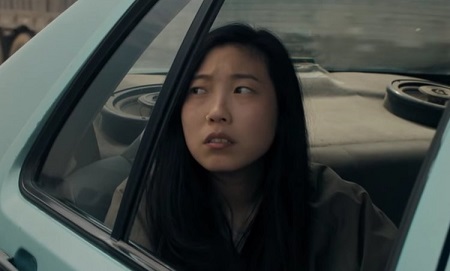
I asked Nora, which is Awkwafina’s real name, I asked her to bring “Nora” along. Awkwafina, in many ways, is a character that she’s created, a stage name. I said, “Forget about Awkwafina. Bring Nora along.” Losing her mother at four-years-old. Being raised by her grandmother. The thought of potentially losing her one day. I asked her to put herself in the shoes of this character and go on the journey, and I think that’s how we were both able to bring our own experiences to the character.
Question: At the end of the day, after The Farewell gets off the festival circuit and general audiences get their chance to take a look at the film, what do you hope they’re talking about?
Lulu Wang: I hope that they’re just talking about how important it is to have an open mind. So often there are things about other cultures that we don’t even think to consider. I think so many people going into the movie might feel one way, and feel very strongly that way. By the end of the movie, it’s not that I hope the movie changes their mind, but I hope that it at least puts a question mark there. That they’re saying, maybe I don’t know everything, and maybe that’s not the point.




